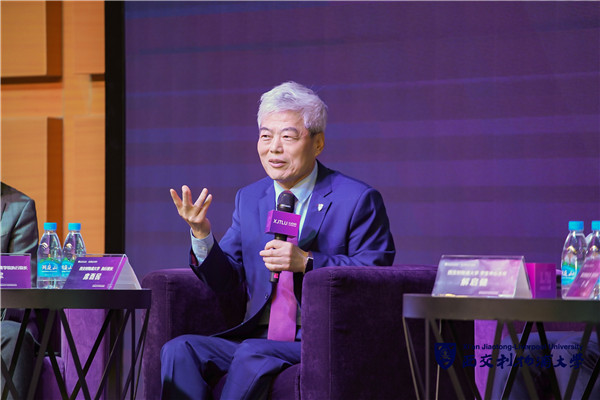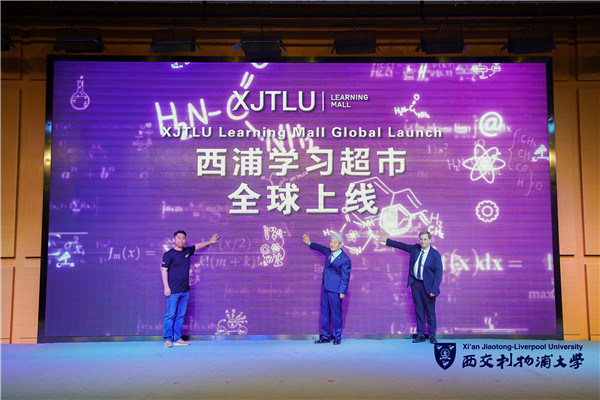XJTLU celebrates 15th founding anniversary
To mark its 15th anniversary, Suzhou-based Xi’an Jiaotong-Liverpool University(XJTLU) launched new academies and opened its innovative lifelong-learning platform, the XJTLU Learning Mall, to the public on May 22.
In 2007, Xi’an Jiaotong-Liverpool University, a partnership between the University of Liverpool in the UK and Xi’an Jiaotong University in China, started with 164 students. Now with 18,000 students from around the globe, XJTLU is the largest joint-venture university in China. It boasts approximately 900 staff from 50 countries and regions.
Key to its success is its unique blend of educational styles, enabling students to become internationally minded global citizens.

Xi Youmin, Executive President of XJTLU speaks at anniversary event on May 22.
“XJTLU took reference from the flexibility offered by the American education system, the emphasis on a robust quality control system from the British system, and the focus on building fundamentals commonly seen in the Chinese system,” says Prof. Xi Youmin, Executive President of XJTLU.
With the arrival of an era driven by digital, artificial intelligence and robotics-enabled innovations, XJTLU added focus on educating future international experts to lead those fields, and on industry-focused academic programs. It’s recently added emphasis on connecting education with society at large.
The University launched its Academy of Future Education, encompassing research and education activities, training for educators in and outside of the University, support for students’ educational growth, and a platform for online and onsite lifelong learning around the globe.
“The future of education is not focused on teachers imparting knowledge to students, but instead on how educational institutions will support lifelong learning,” says Dr Xiaojun Zhang, Executive Dean of the Academy.
The rise of the internet and artificial intelligence has changed how people obtain information, he says, opening pathways to learn outside the traditional classroom.
“Now, learners want the university to prepare them for roles as innovators in society,” says Dr Zhang. “With today’s speed of information delivery, that means fostering ‘learning how to learn’ and providing the best tools worldwide for that purpose.”
“The Academy of Future Education will create a platform and an ecosystem to expand our sphere of influence both within China and internationally,” said Xi Youmin.

To provide tools for all learners, XJTLU and the Academy of Future Education is opening the XJTLU Learning Mall to the public. Available offerings at www.learningmall.cn continue to grow, with partners including Adobe, Microsoft, McGraw-Hill Group, Alibaba Cloud and Digital China providing educational content, training and online certification tests.
XJTLU’s Academy of Film and Creative Technology is also launched. This Academy combines XJTLU’s School of Film and TV Arts in Suzhou and its School of Cultural Technology at Taicang. In the Academy’s second phase, the XJTLU-Enlight Film School in Yangzhou will be added.
“Partnering with media and creative industries will enable us to meet industry needs and train students and professionals to be cultural and creative industry leaders,” says Professor Stuart Perrin, Associate Principal of XJTLU Entrepreneur College (Taicang).
In April, the University and Jiangsu Industrial Technology Research Institute jointly established the XJTLU-JITRI Academy of Industrial Technology, offering masters and PhD programmes to develop professionals with industry and innovation skills who can lead across disciplines.
The JITRI Academy’s masters and doctoral programs are entirely demand-driven, says Dr Ma Fei, Executive Dean of the Academy.
XJTLU’s plans include additional exploration of online-onsite educational models and expansion to other sites like China’s Greater Bay Area (Guangdong-Hong Kong-Macau), where the University plans to establish the XIPU Innovation and Education College (GBA).
“In the future, XJTLU will redefine its social functions, acting as the catalyst and connector between the school and society,” said Xi Youmin. “It will leverage the vast resources available to create a new educational ecosystem that promotes lifelong learning, innovation and entrepreneurship.”